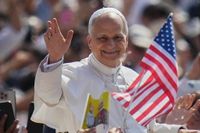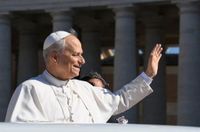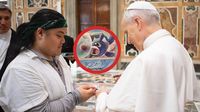On Saturday, August 16, 2025, Pope Leo XIV marked his 100th day as the leader of the Roman Catholic Church—a milestone that has already offered the world a glimpse into a papacy defined by calm, unity, and deliberate listening. Elected on May 8 as the first pope born and raised in the United States, the 69-year-old Chicago native has quietly but unmistakably begun shaping a new chapter for the Catholic Church, one that both honors tradition and faces modern challenges head-on.
Stepping into the role during the Church’s Jubilee Year of Hope, Pope Leo XIV, formerly Robert Prevost, has wasted no time engaging with the faithful. According to Catholic News Agency, he has presided over 16 public Masses in just 14 weeks—a pace that stands in sharp contrast to the final years of Pope Francis, when the aging pontiff was often unable to celebrate Mass at the altar. These liturgies, spanning major feasts and jubilees for families, priests, and youth, have drawn large crowds and palpable enthusiasm, signaling a renewed sense of vitality at the Vatican.
But it’s not just the frequency of his appearances that has caught attention. Pope Leo’s style is markedly different from his predecessor’s. As reported by the Associated Press, Leo XIV has brought a sense of calm and reserve to the papacy, deliberately steering clear of controversy and polemics. He has yet to make any sweeping reforms, headline-grabbing declarations, or major appointments—a sharp departure from the often unpredictable and sometimes turbulent tenure of Pope Francis. Instead, Leo has chosen to listen, consult, and build relationships, especially within the College of Cardinals and key Vatican offices.
This approach has been widely welcomed. "He’s been very direct and forthright … but he’s not doing spontaneous press hits," said Kevin Hughes, chair of theology and religious studies at Villanova University, Leo’s alma mater, in an interview with the Associated Press. Hughes noted that even those who admired Francis often felt a sense of unpredictability, whereas Leo’s steadiness has brought relief. George Weigel, a Catholic analyst, echoed this sentiment in Religion Unplugged, describing Leo as "a man comfortable in his own skin. He’s friendly. He’s a good listener. He thinks before he speaks." Weigel added, "People aren’t on edge the way they were in the previous pontificate a lot of the time."
Leo XIV’s inaugural months have been characterized by a focus on unity, dialogue, and peace. In his first speech as pope, he pleaded, "Help us, one and all, to build bridges through dialogue and encounter." This sentiment has shaped his every move, from his multilingual addresses—seamlessly switching between English, Spanish, and Italian—to his outreach to young people and those suffering from conflict. At a gathering of one million pilgrims on August 3, he declared, "We are with the young people of Gaza. We are with the young people of Ukraine, with those of every land bloodied by war. My young brothers and sisters, you are the sign that a different world is possible. A world of fraternity and friendship, where conflicts are not resolved with weapons, but with dialogue."
Indeed, Pope Leo’s voice for peace has resonated globally. Following U.S. airstrikes on Iranian nuclear facilities in June, he urged world leaders "to stop the tragedy of war before it becomes an irreparable abyss." After an Israeli strike killed three people at Gaza’s only Catholic church in July, he called for "a ceasefire, the release of hostages, and full respect for humanitarian law." His first words as pope—"Peace be with you all"—have proven to be more than a greeting; they are a guiding principle.
Yet, Leo XIV’s papacy is not only about continuity. He has also signaled change, particularly in his approach to modern issues. According to Catholic News Agency, he celebrated the first-ever ecologically inspired Mass and approved a 430-hectare solar farm north of Rome, aiming to make Vatican City the world’s first carbon-neutral state. He has fine-tuned financial transparency regulations, building on initiatives begun by Francis, and has shown a keen interest in the ethical and social implications of artificial intelligence. In a message to the AI for Good Summit in Geneva, he warned, "Humanity is at a crossroads, facing the immense potential generated by the digital revolution driven by artificial intelligence." He drew historical parallels to Pope Leo XIII’s response to the industrial revolution, suggesting that the Church must now address the moral challenges of the digital age.
Pope Leo has also made history by declaring St. John Henry Newman, a 19th-century English convert, a doctor of the Church—a rare honor that recognizes significant contributions to doctrine and spirituality. He has approved the upcoming canonizations of Blessed Carlo Acutis and Blessed Pier Giorgio Frassati, and greenlit seven additional causes, including that of Blessed Bartolo Longo, a former satanist turned Marian shrine founder.
His American roots have not gone unnoticed. In June, a video message from Pope Leo appeared on the jumbotron at Chicago’s Rate Field, home of the White Sox. In it, he urged young people to be "beacons of hope" and invited all to "see that God is reaching out to you, calling you, inviting you to know his son, Jesus Christ." His love of sports has made for some lighter moments—he’s blessed cyclists in the Giro d’Italia, joked with tennis star Jannik Sinner about Wimbledon’s dress code, and received White Sox and Bears jerseys from enthusiastic pilgrims.
Leo’s connection to his Augustinian roots is another defining feature. He frequently quotes St. Augustine in his homilies and speeches, grounding his papacy in a spirituality of prayer, community, and the search for truth. "I am an Augustinian, a son of St. Augustine, who once said, ‘With you I am a Christian, and for you I am a bishop,’" he proclaimed in his first public words on May 8. This grounding has been especially meaningful for those seeking clarity on Church teachings. As Maria Isabel Ibarcena Cuarite, a Peruvian Catholic, told the Associated Press, "Francis was ambiguous, but he is firm," referring to Leo’s emphasis on traditional teachings such as marriage as a sacrament between a man and a woman.
Despite his reserved nature, Pope Leo has gradually grown more comfortable in public. His weekly audiences in St. Peter’s Square are lively, with the pope blessing babies, shaking hands, and sometimes even singing—he surprised a crowd of 200,000 by chanting the Marian hymn during his first Regina Caeli address. This musical touch inspired the Pontifical Institute of Sacred Music to launch an online series to make Gregorian chant more accessible.
Public opinion has responded positively. A recent Gallup poll cited by Religion Unplugged shows Pope Leo enjoying a 57% favorable rating among Americans—higher than any world leader—and 76% among self-identified Catholics. These numbers suggest that his gentle yet purposeful start has already earned him credibility and goodwill, even as he avoids dramatic gestures or rapid reforms.
Looking ahead, much remains to be seen. Pope Leo XIV’s first 100 days have been about laying a foundation, not rushing to judgment or action. His leadership—rooted in attentive listening, tradition, and an openness to the challenges of the modern world—has set a tone of hope and unity. As the Church moves forward, it will do so under a pope who seems determined to let his actions, rather than his headlines, speak for themselves.



